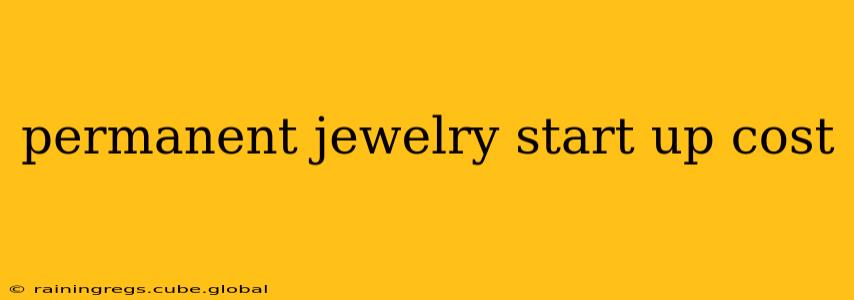Permanent Jewelry Startup Costs: A Comprehensive Guide
Starting a permanent jewelry business can be a rewarding venture, offering a unique and trendy service. However, understanding the startup costs is crucial for success. This guide breaks down the expenses you can expect, helping you create a realistic budget and plan for your new business.
What are the initial costs involved in starting a permanent jewelry business?
The initial investment for a permanent jewelry startup varies significantly depending on your scale, location, and desired level of sophistication. However, key expense categories include:
- Equipment: This is arguably your largest initial investment. You'll need a welder (typically a micro-welder ideal for delicate jewelry), a selection of welding tips, flux, various sizes of jump rings, and potentially a polishing cloth or machine. Prices for welders can range from a few hundred dollars to several thousand, depending on the features and quality. Don't forget safety equipment like eye protection and ventilation.
- Jewelry Supplies: You'll need a stock of chains, charms, and other jewelry components to offer your clients. The initial inventory cost depends on your chosen style and suppliers. Consider sourcing from various wholesalers to find the best prices and variety. Start with a curated selection and expand your offerings as your business grows.
- Business Licenses and Permits: The necessary permits and licenses vary by location. Research your local, state, and potentially federal requirements. This might include a business license, sales tax permit, and potentially a health permit (depending on your local regulations).
- Insurance: Professional liability insurance is crucial to protect your business from potential claims of damage or injury. General liability insurance is also recommended to cover property damage or other unforeseen events.
- Marketing and Branding: Establishing your brand identity is essential. This includes designing a logo, creating marketing materials (business cards, social media graphics), and potentially investing in website development.
- Point of Sale (POS) System: A reliable POS system is necessary for processing payments and managing inventory. This could range from a simple mobile POS app to a more comprehensive system depending on your needs.
- Initial Workspace Setup: Depending on your business model, you might need a dedicated workspace or studio. This could involve rent, utilities, and furnishing costs. If you operate from home, you might need to allocate a specific area and factor in any associated home office expenses.
- Training and Certifications: While not strictly mandatory in all areas, professional training on welding techniques and jewelry making can enhance your skills and build client confidence. Consider certifications to showcase your expertise.
What is the average startup cost for a permanent jewelry business?
Providing an exact average startup cost is difficult due to the variability mentioned above. However, a reasonable estimate for a basic setup might range from $3,000 to $10,000. A more extensive setup with higher-end equipment, a larger inventory, and a dedicated workspace could easily exceed $10,000.
How much money do I need to start a permanent jewelry business from home?
Starting from home can significantly reduce overhead costs, particularly rent and utilities. A home-based setup can potentially start with a lower initial investment, perhaps in the $2,000 - $5,000 range. However, even a home-based business still requires the core equipment, supplies, and business-related expenses.
What are the ongoing costs for a permanent jewelry business?
Ongoing costs include:
- Jewelry Supplies: Replenishing your inventory as needed.
- Marketing and Advertising: Ongoing social media marketing, website maintenance, and potentially paid advertising.
- Insurance Premiums: Annual or monthly payments for your insurance policies.
- Software and Technology: Subscription fees for POS systems or other software.
- Professional Development: Continued training and skill development.
By carefully considering these costs and creating a detailed budget, you can increase your chances of success in this exciting and growing industry. Remember to research your local regulations and market conditions thoroughly before investing.
